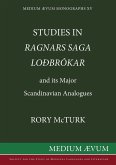Defining Acts considers how the surviving English theatrical works of the fifteenth century represent competing practices of interpretation. The plays take up a series of contests over who could legitimately determine the meaning of texts-men or women, clerics or laity, rulers or subjects, Christians or Jews-and transform these questions for audiences far beyond their original medieval academic contexts. Ruth Nisse focuses in particular on how theater translates the temporal ideas of textual exegesis into spatial models and politics. She situates medieval drama, therefore, both in its vernacular literary setting, as a genre composed against the same cultural background as The Canterbury Tales, Piers Plowman, and The Book of Margery Kempe, and in its performances, which negotiate a range of contemporary social and political issues. Defining Acts begins with an introductory chapter that reveals the dangers and pleasures of theater in a reading of Chaucer's antic Miller's Tale and the violently anti-theatrical Wycliffite Treatise of Miracle Playing. These two radically different works provide a dialectic entry into late-medieval controversies over biblical interpretation and vernacular theology, versions of which then reappear in dramatic texts themselves. Subsequent chapters engage problems such as the clash between civic rule and the authority of women's visionary experiences in the York Plays; competing ideas of labor and poverty in the Towneley Plays; and theories of Jewish exegesis that continue to haunt Christian and national understandings of history in the Croxton Play of the Sacrament. By reading medieval drama in relation to its intertexts, Nisse explores the ways in which ideas previously limited to academic discourse become elements of public theatrical performances, available to new audiences. Her pathbreaking approach to the study of medieval drama makes this book required reading for scholars and students alike.
Hinweis: Dieser Artikel kann nur an eine deutsche Lieferadresse ausgeliefert werden.
Hinweis: Dieser Artikel kann nur an eine deutsche Lieferadresse ausgeliefert werden.








